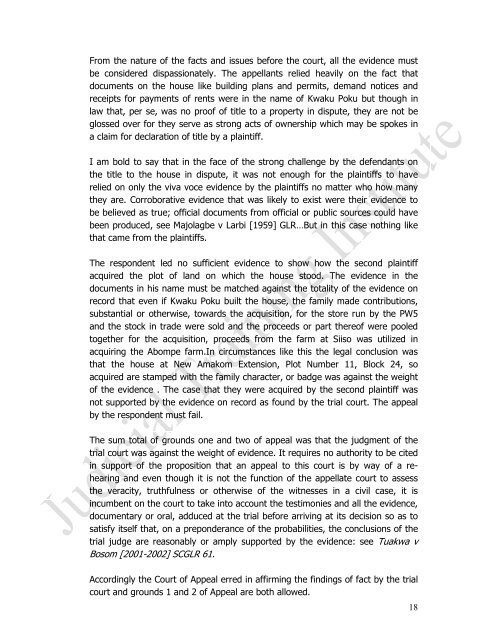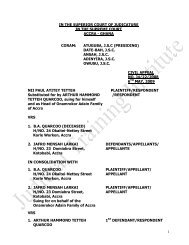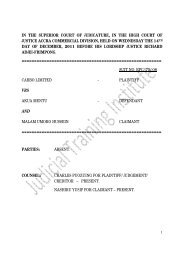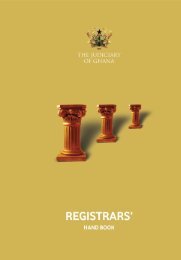AKOSUA DUFIE VRS.pdf - Judicial Training Institute
AKOSUA DUFIE VRS.pdf - Judicial Training Institute
AKOSUA DUFIE VRS.pdf - Judicial Training Institute
Create successful ePaper yourself
Turn your PDF publications into a flip-book with our unique Google optimized e-Paper software.
From the nature of the facts and issues before the court, all the evidence must<br />
be considered dispassionately. The appellants relied heavily on the fact that<br />
documents on the house like building plans and permits, demand notices and<br />
receipts for payments of rents were in the name of Kwaku Poku but though in<br />
law that, per se, was no proof of title to a property in dispute, they are not be<br />
glossed over for they serve as strong acts of ownership which may be spokes in<br />
a claim for declaration of title by a plaintiff.<br />
I am bold to say that in the face of the strong challenge by the defendants on<br />
the title to the house in dispute, it was not enough for the plaintiffs to have<br />
relied on only the viva voce evidence by the plaintiffs no matter who how many<br />
they are. Corroborative evidence that was likely to exist were their evidence to<br />
be believed as true; official documents from official or public sources could have<br />
been produced, see Majolagbe v Larbi [1959] GLR…But in this case nothing like<br />
that came from the plaintiffs.<br />
The respondent led no sufficient evidence to show how the second plaintiff<br />
acquired the plot of land on which the house stood. The evidence in the<br />
documents in his name must be matched against the totality of the evidence on<br />
record that even if Kwaku Poku built the house, the family made contributions,<br />
substantial or otherwise, towards the acquisition, for the store run by the PW5<br />
and the stock in trade were sold and the proceeds or part thereof were pooled<br />
together for the acquisition, proceeds from the farm at Siiso was utilized in<br />
acquiring the Abompe farm.In circumstances like this the legal conclusion was<br />
that the house at New Amakom Extension, Plot Number 11, Block 24, so<br />
acquired are stamped with the family character, or badge was against the weight<br />
of the evidence . The case that they were acquired by the second plaintiff was<br />
not supported by the evidence on record as found by the trial court. The appeal<br />
by the respondent must fail.<br />
The sum total of grounds one and two of appeal was that the judgment of the<br />
trial court was against the weight of evidence. It requires no authority to be cited<br />
in support of the proposition that an appeal to this court is by way of a rehearing<br />
and even though it is not the function of the appellate court to assess<br />
the veracity, truthfulness or otherwise of the witnesses in a civil case, it is<br />
incumbent on the court to take into account the testimonies and all the evidence,<br />
documentary or oral, adduced at the trial before arriving at its decision so as to<br />
satisfy itself that, on a preponderance of the probabilities, the conclusions of the<br />
trial judge are reasonably or amply supported by the evidence: see Tuakwa v<br />
Bosom [2001-2002] SCGLR 61.<br />
Accordingly the Court of Appeal erred in affirming the findings of fact by the trial<br />
court and grounds 1 and 2 of Appeal are both allowed.<br />
18





